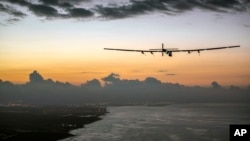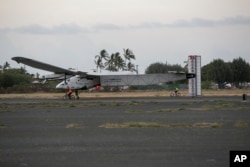The Switzerland-based team attempting to fly a solar-powered plane around the world says the flight has been suspended until next April because of irreparable damage to its batteries.
The team says the batteries on the Solar Impulse 2 overheated during its five-day flight from Nagoya, Japan to Honolulu, Hawaii on June 30. The team says it did not anticipate the effect rapid altitude changes in a tropical climate would have on battery temperature.
Pilot Andre Borschberg landed the Solar Impulse 2 near Honolulu on July 3, after traveling a record-breaking 118 hours across the Pacific Ocean. It was the riskiest leg of its 35,000-kilometer trip around the world because there was no place to land in an emergency.
The plane will be housed in a hangar owned by the University of Hawaii while undergoing repairs and tests on other cooling and heating methods for very long flights.
When the flight resumes, Solar Impulse 2 will fly across the continental U.S. to New York, before crossing the Atlantic Ocean to Europe or North Africa before arriving back in Abu Dhabi, where the flight originated back in March.
The carbon fiber single-seat Solar Impulse 2 has a 72-meter wingspan, which is longer than the wingspan of a Boeing 747, and weighs about as much as an automobile. The 17,000 solar cells built into the wings harness the sun's energy and charge onboard batteries.
The project is the brainchild of Borschberg and fellow Swiss aviator Bertrand Piccard, who are alternating each leg of the historic flight. The duo say they are aiming to demonstrate that alternative energy sources and new technologies can achieve what some consider impossible.






